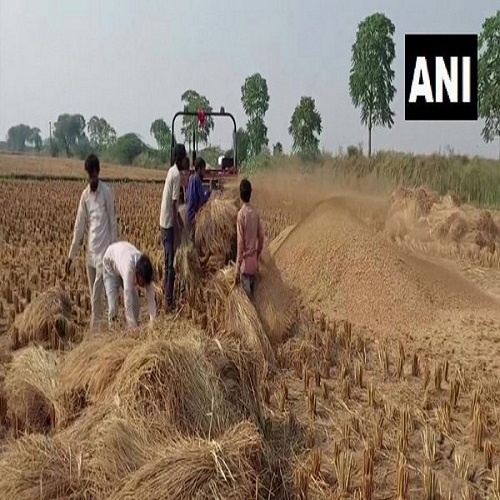New Delhi, September 27: Punjab Government on Tuesday submitted a State action plan and District-wise action plans for tackling the problem of stubble burning to the Commission for Air Quality Management (CAQM) for the current paddy harvesting season, an official statement said.
According to the plan submitted by the government, it commits to an overall reduction of more than 50 per cent in paddy stubble burning incidents this year as compared to 2022.
Action Plans also target the elimination of farm fires in 6 Districts of Punjab. About 20 Million Tonnes (MT) of paddy straw is estimated to be generated in Punjab during 2023 including 3.3 MT of Basmati straw.
“Punjab currently has 1,17,672 crop residue management machines and procurement of around 23,000 machines is underway. CAQM has reiterated to the State Government of Punjab for efficient and optimal utilization of CRM machines through the 23,792 CHCs established for the purpose in the State,” an official statement said.
Commission for Air Quality Management in NCR and Adjoining Areas (CAQM) reviewed the preparedness of the Punjab Government on September 21.
“During the latest meeting, State Government Secretaries in charge of Departments concerned including the Department of Agriculture and Farmer Welfare, Punjab Pollution Control Board (PPCB) and District Collectors (DCs) concerned assured the Commission to take all necessary steps, actions and measures in right earnest to effectively implement the State Action Plan and District Action Plans to achieve significant reduction stubble burning incidents during the current paddy harvesting season,” an official statement said.
The State Action Plan envisages at least a 50 pe rcent reduction in fire counts in Punjab during 2023 compared to last year.
“The plan attempts elimination of paddy stubble burning cases this year in 6 Districts namely Hoshiarpur, Malerkotla, Pathankot, Rupnagar, SAS Nagar (Mohali) and SBS Nagar,” an official statement said.
As per the State Action Plan of Punjab, the total area under Paddy is estimated to be about 31 lakh hectares and paddy straw generation is expected to be around 20 Million Tonnes (MT), this year.
During the meeting, the Commission asked for a detailed mapping of the available Crop Residue Management (CRM) machines and their optimal utilization and availability, particularly for small/ marginal farmers. Punjab currently has 1,17,672 CRM Machines and around 23,792 Custom Hiring Centers (CHCs) have been established in Punjab.
“The State has further planned to procure more than 23,000 machines during 2023. Further, mobile apps like i-Khet (for facilitating farmers to have access to the agriculture machinery/ equipment for In-situ management of crop residue), and “Cooperative Machinery Tracker” are in place to ensure the availability of CRM machines,” the statement said.
“In the review meeting held on September 21, 2023, DCs of Punjab assured that mechanisms are in place towards management of straw in their respective districts through In-situ and Ex-situ management. State Govt plans application of Bio Decomposer in 8,000 acres of paddy area,” it added.
As per the data of 2022, the five districts of Punjab where the maximum crop-burning incidents were reported were Sangrur, Bathinda, Firozpur, Muktasar and Moga, which recorded about 44 per cent of total fire counts of the State.
“State Government representatives including Punjab Pollution Control Board and DCs have assured that all preparations are in place to bring down the cases of stubble burning in the State. With the State Action Plan for control on paddy stubble burning in place including dedicated District-level plans, it is expected that Punjab will witness substantial reduction in the paddy stubble burning cases 2023,” the statement said.
(With inputs from ANI)











